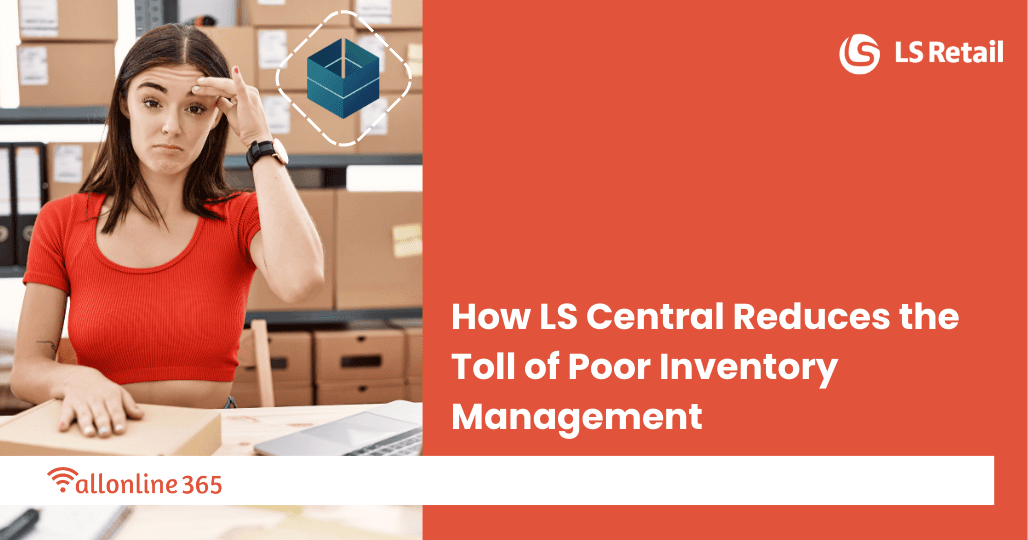Business
How LS Central Reduces the Toll of Poor Inventory Management
Feb 9, 2024
Inventory management lies at the heart of any thriving retail enterprise, having a profound impact on both profitability and customer satisfaction. Consider the cautionary tale of industry giant Toys R Us. Their bankruptcy in 2017 was made worse by the consequences of overstocking. Similarly, Gap experienced significant profit losses and damages due to unsold clothing. Even renowned fast-fashion giant H&M has faced the challenges of both overstocking and stock-outs, especially during periods of high demand.
It is clear that inadequate inventory management can result in significant financial setbacks, including wasted resources, missed sales opportunities, and increased costs.
Navigating inventory management challenges: recognizing the pitfalls
Let’s explore some of the most common effects and consequences of inventory management issues that directly impact a company’s performance and profitability:
Rising storage costs: Holding excessive inventory requires extra storage space, increasing costs for rent, utilities, and upkeep. This could become a significant drain on profit margins.
Product obsolescence and inventory rotation challenges: Overstocking may lead to products becoming outdated or obsolete, resulting in extra expenses for disposing of or selling surplus inventory.
Elevated risk of inventory shrinkage: As stock levels grow, the likelihood of theft, damage, or misplacement increases, leading to financial losses due to inventory shrinkage.
Missed sales opportunities: Insufficient inventory, or understocking, can result in lost sales chances when customers are unable to find and purchase the products they seek.
Diminished customer satisfaction: Stock-outs result in customer dissatisfaction and tarnish a business’s reputation.
Strained cash flow: Having too much money tied up in inventory can strain a company’s cash flow, limiting its capacity to invest in growth initiatives. On the flip side, understocking can lead to lost sales and reduced cash flow, reducing investment opportunities in various areas of the business.
These challenges underscore the necessity for retailers to promptly address inventory management issues, given their profound impact on overall financial performance.
Identifying the Main Causes of Improper Inventory Management
1) Relying on intuition and manual processes:
Business owners and managers who are using personal knowledge or experience to manage inventory may end up in trouble once their business grows in size and complexity. Retailers with multiple store locations, or stocking a high number of SKUs, need to use technology to keep track of what products are going in and out, and at what speed. Unfortunately, many of them still rely on outdated methods such as spreadsheets, local software which only manages warehousing but not sales, or separate solutions which doesn’t communicate to other stores or to HQ.
To overcome these challenges, retailers need inventory management software that covers not just the warehouse, but also the stores and back office. This kind of software enables you to organize your data and automatically analyze it, giving you both a big-picture view and the detailed information you need to make informed decisions, fast.
2) Changes in demand:
Product demand can change for various reasons, from seasonal shifts to holidays to special events. While some factors can be predicted, others may catch businesses off guard. As a result, it can be a challenge to accurately forecast stock needs, and the chance of wrong inventory purchases is high. This problem can be made worse if business don’t strategically price products, or don’t effectively promote their business during seasonal buying periods.
Businesses need to understand the impact of seasonality and holidays on demand, so they can strategically plan their assortment, manage procurement, and avoid the risks of overstocking or understocking. Technology that helps visualize and summarize how seasonal shifts affect customer preferences enables businesses to optimize inventory levels to meet customer demands.
3) Too many software systems and integration issues:
Juggling multiple systems can lead to siloed data and wasted hours in manual reconciliation. The complexity only grows when retailers have a chain of stores, with many products. When operating your business using a disparate system, you risk running into inaccurate data and delays in synchronization, which in turn can translate in stock-outs, overstock situations, and missed sales opportunities.
Elevating retail efficiency with a unified software solution
Businesses that strive for operational excellence need to switch from outdated, overly complicated methods to modern retail management software. Companies that invest in solutions like LS Central are better positioned to simplify their operations well beyond inventory management. LS Central extends Microsoft Dynamics 365 Business Central, enabling retailers to run their POS, inventory management, store operations, financials, supply chain management, eCommerce, and customer loyalty within one comprehensive platform. Having a single, extensive software eliminates the challenges of integrating separate solutions. At the same time, retailers get clearer and reliable data.
LS Central is the ideal choice for retailers that need advanced replenishment functionalities with real-time visibility into sales and stock levels across multiple locations. The latest replenishment features and improvements include Bill of Materials (BOM) and component replenishment for businesses with multiple legal entities, seamless integration of assembly orders into replenishment calculations, improved lead time functionality, and enhanced manual replenishment features.
With LS Central for retail can address the significant costs resulting from inadequate inventory management. Additionally, it can simplify their overall retail operations, drive sales growth, and gain a clear understanding of the entire retail business.
For further information on Netronic Visual Scheduling Solutions. Don’t hesitate to get in touch with allonline365 at +27 (21) 205 3650, email us at contact@allonline365.com or visit our website www.allonline365.com.
stay in the loop
